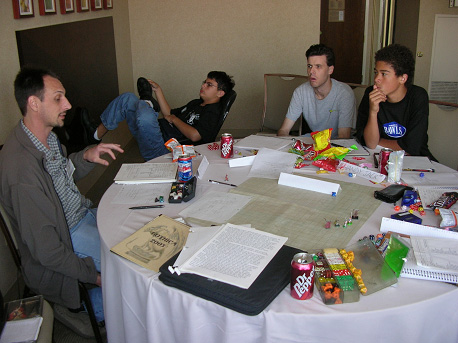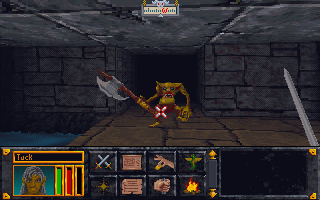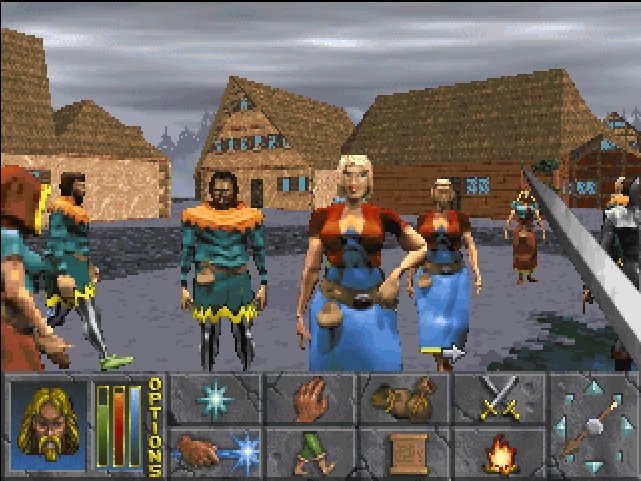While this blog is about a video game, I do not use a great deal of gamer jargon. There are, however, a few terms that might require definition for those who are not familiar with the genre.
Role-playing games (RPGs) originated in the 1970s as pencil-and-paper games, the most famous example of which is TSR's
Dungeons & Dragons. A group of players create characters (called, not surprisingly, Player Characters, or PCs) who are defined by both qualitative information (name, race, skills) and quantitative data (numbers that represent strength, intelligence, dexterity, and so on). During a game session, the players (often sitting at a table, hence the term "tabletop game") verbally describe their PCs' actions:
I open the door and ready my +2 Mace of Lightning. One player, known commonly as the Game Master (GM), controls all other aspects of the game, of which there are many. While each player only needs to embody his own character, the GM must portray all of the other characters with whom the PCs interact (called NPCs or Non-Player Characters) and all of the enemies against whom the PCs battle. The GM also controls and updates the maps of each adventure, determines which encounters will happen where, and adjusts the adventure to adapt to the often unpredictable behavior of the PCs. Although much of the appeal of RPGs comes from the high degree of player and GM control over the game (a kind of shared improvisational fantasy), the other attractive element is the role of chance. Die rolls from both players and the GM determine the outcome of battles, spells, and many other vital aspects of the game. The players, therefore, experience both the satisfaction of creating and controlling a fictional character and the thrill of navigating through an unpredictable series of encounters. Furthermore, even though individual adventures may end and some players do better than others, tabletop RPGs have no defined endpoint, no winners, and no losers; even if a PC dies, the player can create a new character and start all over.
 |
| A Dungeons & Dragons gaming session. The gentleman on the left is most likely the GM (or Dungeon Master, the preferred term for D&D GMs), given his position relative to the players. Note the character sheets, dice, and copious junk food. |
It should come as no surprise that RPGs formed the basis of some of the first mass-produced video games. Text-based games such as
Zork (1979)
and early graphic-based games such as the
Ultima series (1981) borrow heavily from tabletop gaming features, including a reliance on PC decision making and the use of numerical data to represent PC attributes (e.g. hit points, or HP, to determine how much damage a PC can take). In all of these action-adventure RPGs, from the earliest titles to
Skyrim, the computer assumes the role of the GM. Because the computer is able to store dungeon maps, create and control NPC data, and calculate success probabilities of set events, video RPGs are able to provide the kind of immersive role-playing experience that has been drawing players to the genre for decades, while incorporating graphics-rendering power that seems to grow exponentially with each successive generation.
Enter the first-person shooter (FPS). The first-person perspective has been a feature since the early days of video games; the light-gun game
Duck Hunt (1969), for example, places the player in the perspective of the hunter. This point of view enhances the sensory engagement of the player by emulating what she would see if she were actually doing the representative action of the game: shooting the gun, driving the car, or (most relevant to this study) exploring the dungeon and fighting the goblins. In the early 1990s, video game designers began developing what came to be known as first-person shooter (FPS) engines. These powerful and sophisticated graphics programs have produced increasingly complex and realistic 3D environments. As these games approach photorealism, they become that much more potent as fields of moral engagement. Consider the progression of games in
The Elder Scrolls series:
 |
| The Elder Scrolls: Arena (1994) |
|
|
 |
| The Elder Scrolls II: Daggerfall (1996) |
 |
| The Elder Scrolls III: Morrowind (2002) |
 |
| The Elder Scrolls IV: Oblivion (2006) |
 |
| The Elder Scrolls V: Skyrim (2011) |
The more "real" the setting feels to the player, the more likely he is to think seriously about the moral repercussions of his actions -- not because he mistakes it for reality, but because the game's verisimilitude rewards greater intellectual and emotional investment in the way that a flight simulator rewards the investment of the budding aviator.
As a side note, I should point out that I use the term FPS liberally to describe all combat-based first-person games, whether any actual "shooting" occurs. Technically,
Skyrim is an action-adventure RPG in a fantasy setting that uses a combination of first-person and third-person perspectives, as well as a few cinematic animations, but the use of the terms RPG and FPS is much simpler for a study of this kind.






No comments:
Post a Comment